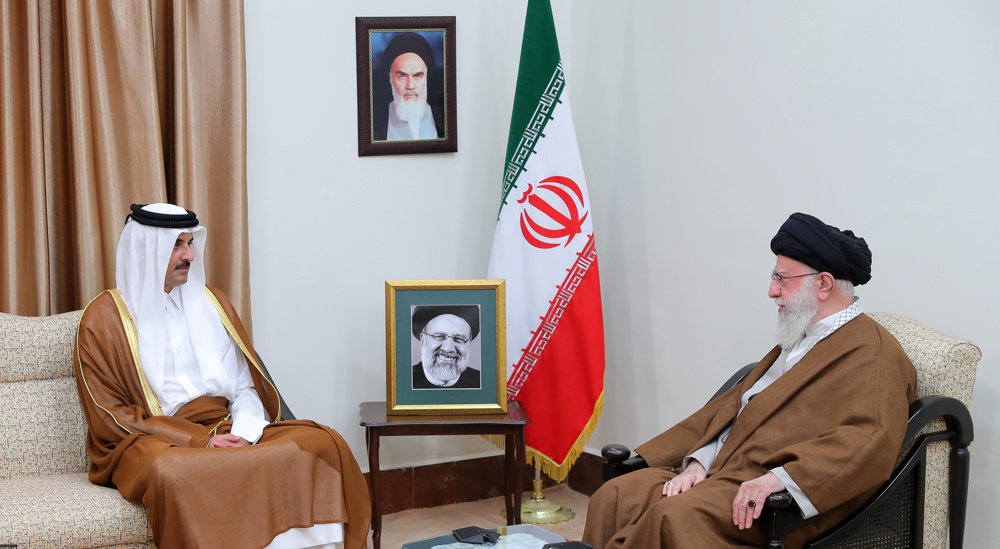Leader of the Islamic Revolution Ayatollah Seyyed Ali Khamenei says Iran will continue to strengthen bonds of friendship with regional states despite the “difficult” loss of President Ebrahim Raeisi.
Ayatollah Khamenei made the remarks in a meeting with Qatar’s Emir Sheikh Tamim bin Hamad Al Thani, who was visiting Tehran to honor the late president, whom the Leader described as a “polyhistor.”
The Leader expressed gratitude for Qatar’s condolences and emphasized the importance of advancing collaborative relationship between Iran and Qatar.
Ayatollah Khamenei said countries in the region have no option but to unite in the face of adversarial efforts to disrupt stability and peace in the region.
Meanwhile, the Qatari emir said relations between Iran and Qatar have always been strong and this path will continue.
“We see no limits for expanding relations with Iran.”
‘Need to uplift Iran-Pakistan ties’
Ayatollah Khamenei also received Pakistan’s Prime Minister Shehbaz Sharif. The Leader expressed sincere gratitude for the sympathy of the government and brotherly people of Pakistan.
He said Iran attaches top priority to its relations with Pakistan, and believes in the possibility of uplifting ties under the new Pakistani government.
“Friendly relations between brotherly countries do not always go smoothly, and we must overcome obstacles and pursue the progress of cooperation with determination and in practice,” the Leader stated.
“Raeisi’s recent trip to Pakistan could be a turning point in relations between the two countries,” the Leader said. Acting President Mohammad “Mokhber will pursue the path of cooperation and the agreements.”
Sharif also described Raeisi’s recent trip to Pakistan as beneficial and a foundation for further expansion of relations and the roadmap to the future.
Leader praises Tunisia’s anti-Israel stance
The Leader also held a meeting with the visiting Tunisian President Kais Saied.
Ayatollah Khamenei welcomed the renewal of relations between Iran and Tunisia, facilitated by Saied’s visit to Iran.
He underscored that the presence of a virtuous and academic figure like Saied at the helm of Tunisia presents an opportunity for the country to enhance its international standing after years of despotic rule and isolation from the Islamic world.
Ayatollah Khamenei referred to the 2011 Tunisian protests that triggered a wave of movements across North Africa and remarked on the Tunisian nation’s significant potential for progress and advancement.
He expressed hope that Saied’s prudence would foster unity among Tunisians from all walks of life, laying the groundwork for further progress.
Ayatollah Khamenei also commended Saied’s stance against Israel, stating that such positions should be promoted within the Arab world and that steadfastness and perseverance are the only avenues to success.
In the meeting, President Saied conveyed condolences from the government and people of Tunisia over the tragic loss of President Raeisi, saying he and the late president had planned to meet in Tehran soon.
The Tunisian president, referring to the shared intent of both countries to broaden relations in all areas, expressed hope that by pursuing the agreements, the expansion of cooperation would materialize in practice.
President Saied also addressed the ongoing crisis in Gaza, saying the Islamic world must abandon its current passive stance and actively seek to vindicate the rights of the Palestinian people across all Palestinian territories and push for the establishment of an independent state with al-Quds as its capital.
“Today, the global human society has outpaced the international community, with people in various countries uniting against the oppression and atrocities in Gaza.
Source: Press TV



